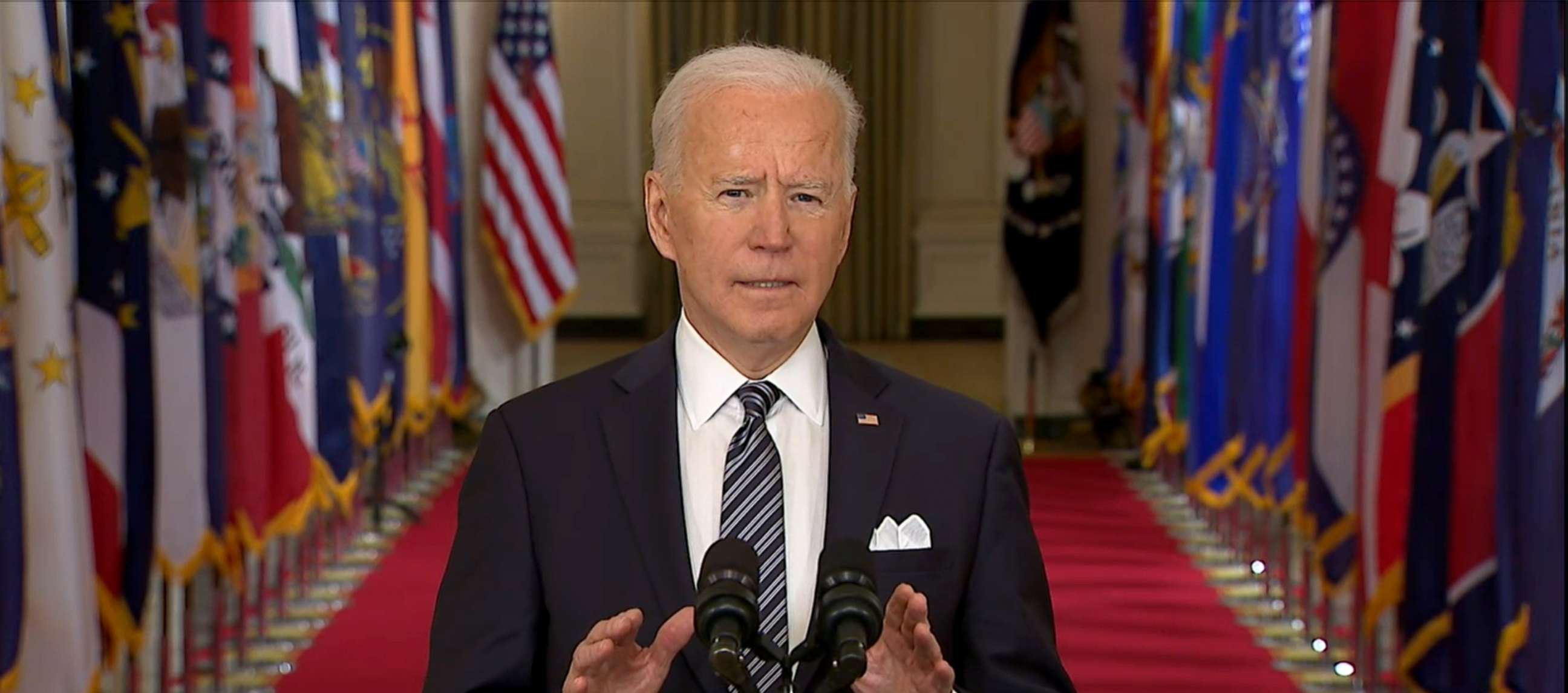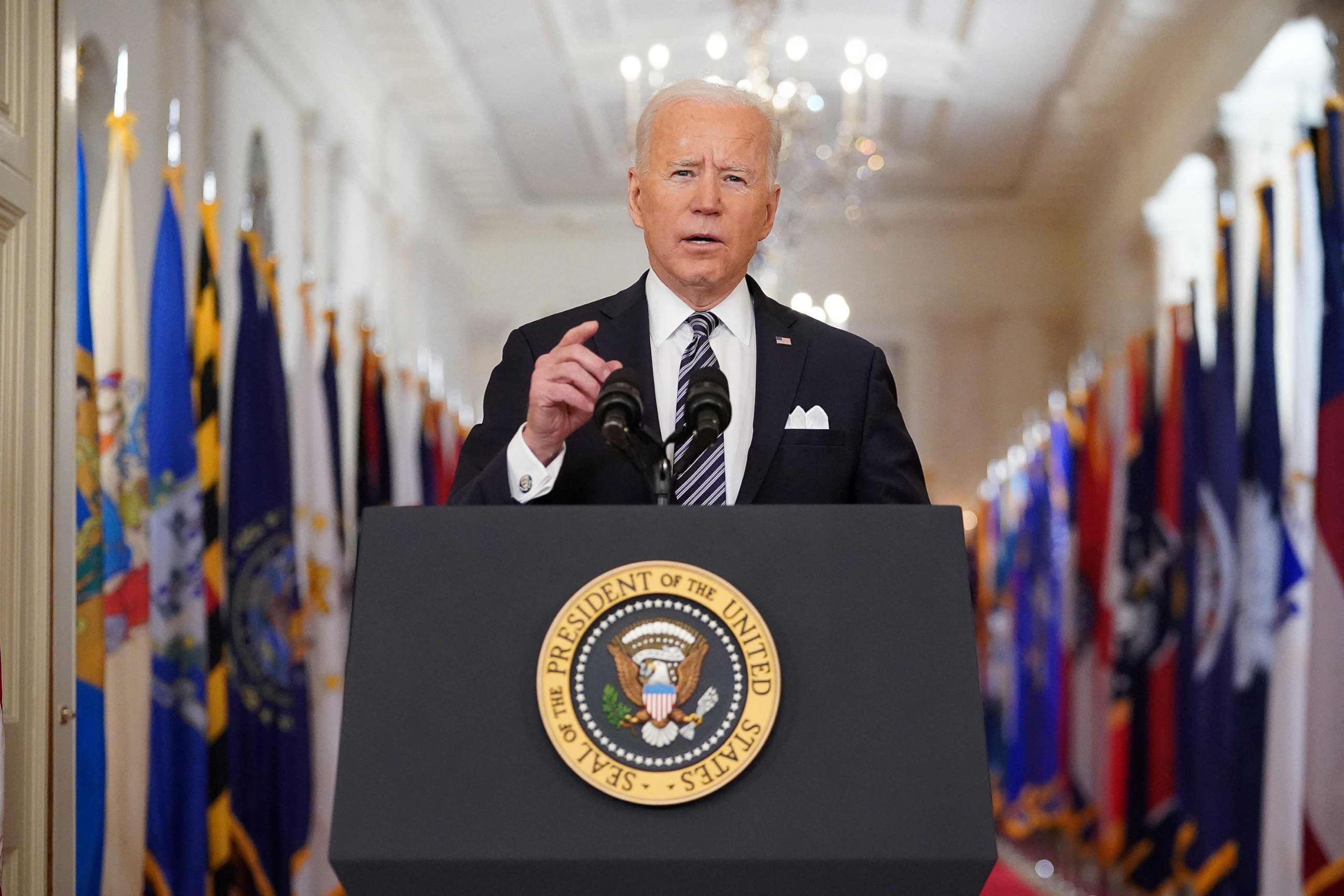Biden tempers COVID optimism with calls for unity -- and patience: ANALYSIS
What happens from here matters now, for the sake of public health and history.
President Joe Biden addressed the nation Thursday night to mark a full year of the COVID crisis -- as awful and painful as any year in America's living memory.
But it's what happens from here that matters now, for the sake of public health as well as history.
Even with a massive legislative victory in his pocket, the still-nebulous pandemic endgame has Biden's focus, if not necessarily the public's full attention. Passing the $1.9 trillion package was hardly easy, yet implementing it effectively and selling a restless nation on what it still needs to do could prove significantly more difficult.
"Here is the truth: The only way to get our lives back, to get our economy back on track, is to beat the virus," Biden said, in his first prime-time address as president. "I will not relent until we beat this virus. But I need you, the American people. I need you."
"This fight is far from over," he added.

Biden's tone was somber. He spoke of mourning and loss, of economic and personal devastation. He decried bigoted attacks and also what he called lost "details of life" -- birthday parties, wedding celebrations, graduations, "all the things that needed to happen but didn't."
The president offered glimmers of hope with a guarantee that all American adults would be eligible for vaccinations by May 1, with enough vaccines produced by the end of that month. He held out hope for a "truly special" July Fourth, where at least small gatherings could mark "independence from this virus."
But tellingly, Biden didn't give an estimate for when things could return to normal. He avoided clichés like "rounding the turn," which became commonplace in speeches given by his predecessor.
"Things could get worse again," the president warned, counseling Americans to continue to heed advice about mask-wearing and social-distancing, and to get vaccinated when they are able to. "This is not the time to let up."
In a refrain that it's hard to imagine any of several recent presidents employing, Biden called for Americans to follow the rules and advice promulgated by federal officials.
"Put trust and faith in our government," Biden said. "The government isn't some foreign force in a distant capital. It's us -- all of us, we the people."

The somber milestones of a year of COVID come with reasons for hope. Vaccines are rolling out and getting into arms in growing numbers -- allowing Biden to push up his timeline Thursday night. The first stimulus checks from the latest legislative package could be cashed as soon as this weekend.
The obstacles ahead remain daunting, ranging from political and economic to societal and structural. The pandemic is decidedly not over and the Biden administration's own contradictory messages on expected timelines reflects a numbing reality: even now, no one can say when it will be a thing of the past.
Signs of public impatience are growing. The early days of spring weather have revealed frustrations about the pace of school reopenings. Some governors are starting to lift mask mandates and capacity restrictions -- prematurely, in the view of the president and public-health experts.
Partisanship is impossible to disentangle from the moment. The COVID package passed without a single Republican supporter in either the House or Senate, after previous bills under former President Donald Trump garnered wide bipartisan backing.
Biden has to worry about voices in his own party as well. Some progressive leaders see the fact that no Republicans voted for the package as confirmation of an important lesson Biden seems disinclined to learn.
The jettisoning of a minimum-wage increase from the package was a particular sting to liberal lawmakers and advocates. Several made clear that while they supported Biden's bill, they see their work in pushing a progressive agenda as more urgent going forward.
"I was proud to support the American Rescue Plan," Rep. Ayanna Pressley, D-Mass., said at a news conference Wednesday calling for rent and mortgage cancelation during the pandemic. "But make no mistake: Our work is not over and it must continue."
The failure to garner GOP support begs a question that will become more urgent for Biden from here. If members of the two parties couldn't come to a spending agreement in the midst of a public health and economic crisis, how can they work together to defeat the virus and take on other challenges in the months and years ahead?
Biden nodded to the political divisions that have plagued the COVID response and continue to threaten it now, even while decrying the delayed actions of confronting the virus under the Trump administration.
"Too often, we turned against each other," he said.
Now, just past the midpoint of the critical first 100 days, Biden has the resources he asked for and the technical capacities his team believes will end the pandemic. His big ask is what he has long held out as a central promise of his candidacy and now his presidency.
"Beating this virus and getting back to normal depends on national unity," the president said. "Unity is what we do together as fellow Americans."




